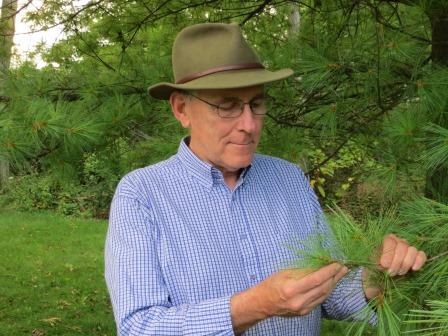
Jim Finley
Dear Woodland Friends,
Nearly two years ago the Center for Private Forests hosted the first Future of Penn's Woods conference. When the idea for that event began to germinate, those on the planning committee were thinking it was a once and done event. We were overwhelmed by the response in 2013 and the clear strong support for doing it a second time. Now, as we come together in 2015 we are thinking this will become a biennial event with the focus of bringing people who care about forests to a conversation about how we demonstrate our stewardship of our working forest landscape.
Forest stewardship is not a complex idea and over the years you have likely heard many definitions and expressions of the idea. Personally, I've come to like one penned by John Elder from Vermont in an essay he wrote several years ago.
"We must conceive of stewardship not simply as one individual's practice; but rather as the mutual and intimate relationship, extending across generations, between a human community and its place on Earth."
This is a simple statement that acknowledges our individual linkages and commitments to the land, concepts of time, and emphasizes our linkage as people to all the Earth's communities. Stewardship is about doing what we can individually for the good of all.
What then do we mean by working forests? For whom do they work? To be clear, working forests are about more than just creating income and economic value. Working forests extend to economics, social, and ecological values. Forestry is much more than cutting trees and making money; it is about forests and all the values they provide. In a recent Penn State study we asked landowners to tell us about the value they attributed to their forests. The list was long and it was clear that people draw more value from the amenities than the dollars returned.
In a recent discussion, someone argued that we need to monetize the noneconomic values we derive from forests, which clearly is not easy. If it were, we would have done it years ago. What is the value of songbirds, clean water, or an amazed and surprised grandchild? Maybe it is time we consider that economics should be on the same scale as our other values. Individually and personally how do you value your forest? How does the community where you live benefit and value your contribution to the quality of all our lives?
There are no easy answers here. We each have to consider our relationship to the land we love. Sometimes we need to take economic value from the land. This is fine and necessary. A working forest can provide those values, but we need not sacrifice all values for one.
Over the two days of the conference, you will have many opportunities to learn, share, and grow. Take the time to meet people who share your values with the land. Consider how you steward your forest, today and how will it be cared for tomorrow. Share your love of the land!
Jim
James C. Finley Center for Private Forests
Address
416 Forest Resources BuildingUniversity Park, PA 16802
- Email PrivateForests@psu.edu
- Office 814-863-0401
- Fax 814-865-6275
James C. Finley Center for Private Forests
Address
416 Forest Resources BuildingUniversity Park, PA 16802
- Email PrivateForests@psu.edu
- Office 814-863-0401
- Fax 814-865-6275

